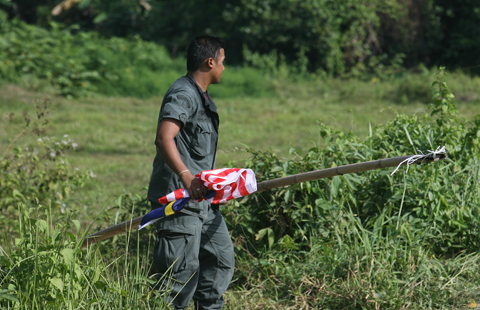Telltale signs of grim future from August 31 incidents

On Friday August 31 which coincided with Malaysia’s Independence Day and the founding of the Bersatu movement, Islamic militants and their sympathizers staged what was said to be a symbolic exercise by planting fake and real bombs, torching Thai national flags and hoisting Malaysian national flags and putting up posters challenging the Thai state at 102 spots in Yala, Pattani, Narathiwat and Songkhla provinces.
Although only five real bombs exploded or were detonated in Narathiwat, wounding only five soldiers, the fact that the outlaw elements were able to carry out such a daring feat in broad daylight and in urban areas, some of which not far away from the checkpoints manned by security forces has caused widespread alarm about the capability of the militants and the efficiency of security forces in dealing with the insurgency problem.
A breakdown of the 102 incidents is as follows: 34 incidents in Yala, 44 incidents in Narathiwat, 12 incidents in Pattani and 12 incidents in four districts of Songkhla.
The Isra news team has talked with several people about the August 31 incidents and came up with four observations and questions for the government and its security apparatus.
1. All the disturbance incidents which occurred almost simultaneously would not have been possible without the involvement of a large number of participants although the same group of perpetrators might have staged more than one incident. Some of the incidents would take time to carry out such as the hoisting Malaysian flags on high-powered electric cables. The question is why the militants and their supporters were able to operate so freely and without the itnterference of the security forces?
2. This daring exercise must have been planned for some time because it involved many cars, men and equipments such as the wooden poles to fly the Malaysian flags. The question is there are more than 60 road checkpoints in the four provinces and how come they missed or failed to stop the perpetrators?
3. Of particular concern is that some of the incidents which took place in Yala’s municipal area were supposed to be patrolled around the clock. The question is "Was it true that the area patrolled around the clock?":
4. Did the incidents a clear indication that the militants could operate any time, any where as they so wish?
5. The Thai security has claimed that the number of the militants and their sympathizers has declined to about 9,000 with several of them either arrested or defected. But the August 31 incidents appear to tell a different story?
Dr Panitharn Wattanayakorn, a security expert at Chulalongkorn University, said the August 31 incidents were alarming because they showed that the insurgency movement was capable of mobilizing new recruits to join their ranks. Had all the bombs planted been real, the damages would have been extensive and Thailand’s image would suffer badly.
He predicted more violence in the future and urged the government to explore peace talk option in order to bring about peace in the restive region.
What appeared to be annoying is that the policy-making people in the government do not understand the real problems and are insensitive to the Malay Muslims. For instance, a statement made by a deputy prime minister in charge of security affairs that that the Thai identity must be stressed in the restive region which clearly showed his insensitivity to the ethnic difference in the region.
Another glaring example of the decision-makers’ lack of understanding of the unrest situation in the deep South was the recent transfer of General Sathian Permthong-in, defence permanent secretary, to oversee development projects by the military in the border provinces. This showed that the unrest problem was not treated as a priority problem and anyone could be assigned to work there.
Meanwhile, it was reported that Prime Minister Yingluck Shinawatra would have a sideline discussion on the unrest problem in southern Thailand with her Malaysian counterpart during the Apec Summit during September 7-9.
Thai security officers have played down the Malaysian flag hoisting incident saying that Kuala Lumpur had nothing to do with the incident and that the good neighbourly relations between the two countries remains intact.
National Security Council secretary-general Wichian Potephosri said it was not difficult to bring Malaysian flags into southern Thailand because Malaysian officials had distributed many Malaysian flags to their people in Malaysia to be flown on the independe day on August 31. Besides, bringing the Malaysian flags into Thailand is not illegal, he explained.
The NSC chief said that revocation of dual nationalities for some Thais could be an issue for discussion with Malaysian authorities in order to prevent the militants from capitalizing on dual citizenships by taking refuge in Malaysia after they committed offences on Thai soil.
-------------------------------------------------------------------------------------------------------------
Photo by Abdullah Wangni
